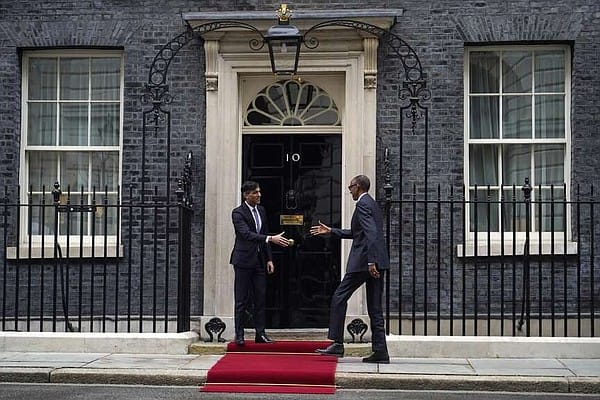Britain debates Rwanda deportation bill

Source: Northwest Arkansas Democrat Gazette
LONDON -- A key plank in the British government's plan to send some asylum-seekers on a one-way trip to Rwanda is expected to become law this week, but opponents plan new legal challenges that could keep deportation flights grounded.
A bill aimed at overcoming a U.K. Supreme Court block on sending migrants to Rwanda is due to pass Parliament after the government overcomes efforts to water it down in the House of Lords.
The Rwanda plan is key to Prime Minister Rishi Sunak 's pledge to "stop the boats" bringing unauthorized migrants to the U.K., and Sunak has repeatedly said the long-delayed first flights will take off by June.
"This week Parliament has the opportunity to pass a bill that will save lives of those being exploited by people-smuggling gangs," Sunak's spokesman, Dave Pares, said Monday. "It is clear we cannot continue with the status quo ... now is the time to change the equation."
It has been two years since Britain and Rwanda signed a deal that would see migrants who cross the English Channel in small boats sent to the East African country, where they would remain permanently. The plan has been challenged in the courts, and no one has yet been sent to Rwanda under an agreement that has cost the U.K. at least $470 million.
In November, the U.K. Supreme Court ruled that the Rwanda plan was illegal because the nation wasn't a safe destination for asylum-seekers. For decades, human rights groups and governments have documented alleged repression of dissent by Rwanda's government both inside the country and abroad, as well as serious restrictions on internet freedom, assembly and expression.
In response to the ruling, Britain and Rwanda signed a treaty pledging to strengthen protections for migrants. Sunak's government argues the treaty allows it to pass a law declaring Rwanda a safe destination.
The Safety of Rwanda Bill pronounces the country safe, making it harder for migrants to challenge deportation and allows the British government to ignore injunctions from the European Court of Human Rights that forbid removals.
The bill has been approved by the House of Commons, where Sunak's Conservatives have a majority, only for members of Parliament's unelected upper chamber, the House of Lords, to insert a series of amendments designed to water down the legislation and ensure it complies with international law.
The Commons rejected the changes last month, but the Lords refused to back down. The Commons is expected to send the unmodified bill back to the Lords late Monday in a process known as parliamentary ping pong. The back-and-forth could continue for several days, but ultimately, the elected Commons can overrule the unelected Lords.
Once the bill becomes law, it could be weeks before any flights to Rwanda take off, as people chosen for deportation are likely to lodge legal appeals.
Just under 30,000 people arrived in Britain in small boats in 2023, and Sunak has made reducing that number a key issue ahead of an election due later this year. Some 6,000 people have made the journey so far in 2024, up from the same period last year, including 534 in 10 boats on Sunday.
The opposition Labour Party, which leads in opinion polls, opposes the Rwanda plan, arguing it won't work, and says it would work with other European countries to tackle people-smuggling gangs.
The Times of London reported Monday that the U.K. government had approached other countries, including Costa Rica, Armenia, Ivory Coast and Botswana, about making similar deals if the Rwanda plan proves successful. The government said only that Britain is "continuing to work with a range of international partners to tackle global illegal migration challenges."
